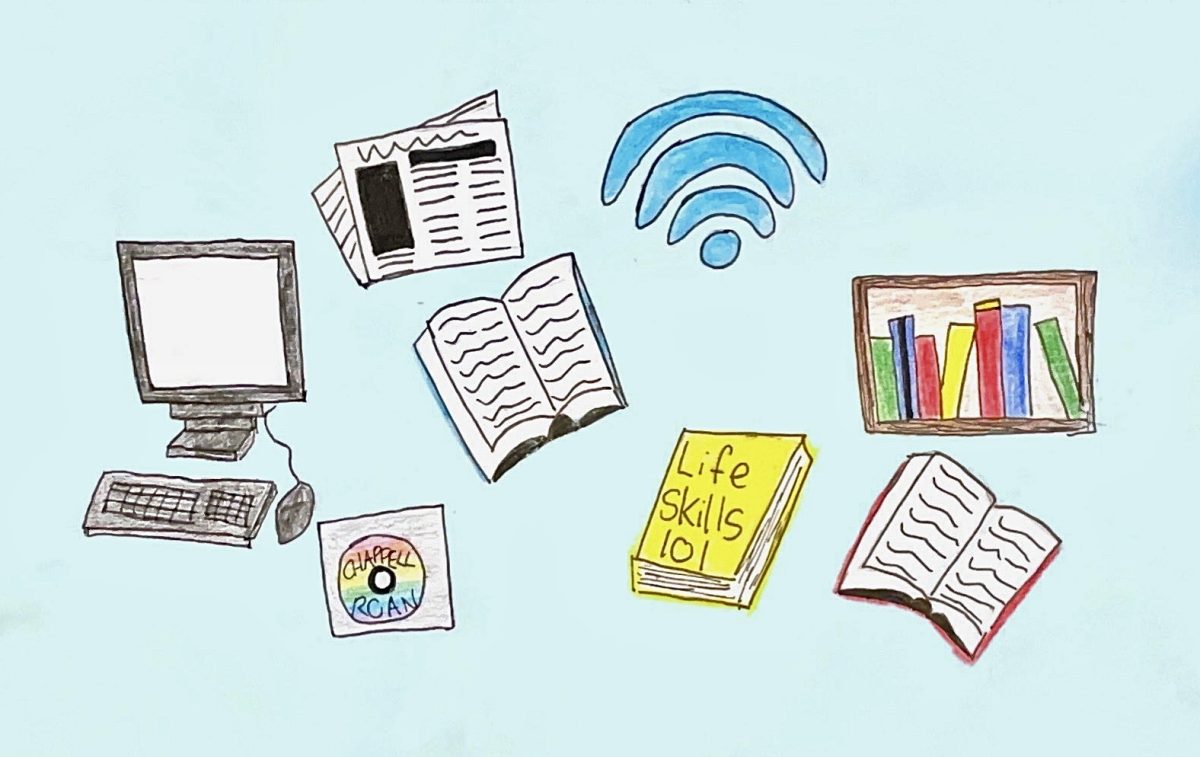Spending an afternoon at the library was a treasured pastime in my childhood.
I have many memories of leaving my local library with a bag full of “Angelina Ballerina” books and “Bear and the Big Blue House” DVDs, along with a Pizza Hut coupon and a sticker from the summer reading program.
Recently, I’ve found myself longing for the comfort that the library provided me in my youth. I miss spending time curled up in a cozy chair reading or browsing bookshelves to find the latest in my favorite book series.
In college, the library has become a place I only ever visit to sit at a desk and do homework, squinting at a screen for hours on end.
It’s time we reclaim the nostalgic warmth that libraries can and should provide, as well as recognize the many benefits of supporting our local public libraries.
The average number of library visits has fallen by nearly half in the past decade, according to the Institute of Museum and Library service’s 2024 Public Library Survey.
The need for libraries has decreased due to our shift to the digital age, with Google replacing the need for using library books to look up information, according to a Dec. 22, 2016 Guardian article.
One reason I have so much nostalgia for libraries is because they remind me of a time where technology was limited.
Growing up in the 21st century on the cusp of the digital revolution, I remember a time when I didn’t have to stare at a screen for hours and could get lost in book after book all day long.
Gen Z is one of the top consumers of print books and physical music albums today, according to a July 5, 2024 Fortune article.
This makes our generation the prime target for libraries. If libraries can capture the hearts of teens and 20-somethings, they will be able to quickly regain their audience.
Despite access to technology in most homes, libraries still provide a valuable resource to our community. Libraries can provide a space for those who do not readily have access to technology to use the same resources as others.
For others, libraries provide a free “third place” with endless resources, as well as an escape from the 21st century’s reliance on consumerism.
“Third place” is a sociological term that describes a place besides the home and the workplace where a person can go to unwind and connect with their community, according to an article from the University of Chicago’s English Language Institute.
Libraries can provide the perfect third place: a relaxing environment where a person can simply exist without spending a dime.
“We’re learning how to be well and to get along with each other, even when we have different opinions,” said Emer Pond Feeney, assistant director of Fletcher Free Library. “I think the library is a place that allows space for that to happen, and you don’t have to have money in order to engage in it.”
Additionally, libraries provide an alternative to the over-consumption promoted by “#BookTok,” Tik Tok’s reading community, filled with book recommendations and micro-influencers pushing viewers to buy their latest picks.
Checking out books from the library allows book lovers to still experience the books they’re interested in without having to spend money on a book they’ll likely only read once and then set on a shelf for years to come.
However, all of the resources that public libraries provide come at a price. In 2023, Vermont’s state legislature put together a lengthy report discussing the role libraries in Vermont play in their communities, and how funding is impacting these resources, according to a Nov. 8, 2023 Vermont Public article.
Vermont libraries do everything from helping community members access healthcare and find work, to providing new digital resources and combatting a new wave of book bans nationally, according to the article.
In order for libraries to take on this vital role, they need more funding. Providing digital resources such as eBooks is more costly than print resources, and librarians are already not being paid enough for the work they do, according to the article.
This is why it is necessary for public libraries to have access to more funding. While Vermont legislators have already taken steps toward this with research, they need to continue down this path by taking action with new and improved policies as well.
For UVM students, Fletcher Free Library is a great place to experience everything the public library has to offer right in Burlington.
Located on College Street, Fletcher provides a wide range of programs from therapy dog visits to yoga classes, as well as a place to simply do homework, use their free printers, browse through books and relax.
For others, Fletcher supplies museum passes, event meeting rooms, tech support, Wi-Fi hotspot kits, online classes and a myriad of other resources.
“We kind of are everything. Come be here. It’s your community living room,” Feeney said in the Sept. 4 interview.
UVM students and residents of Burlington are also eligible for a free library card from Fletcher: just bring your student ID and sign up, according to Fletcher Free Library.
Additionally, UVM students and the rest of the Burlington community can support the library by choosing library resources over making purchases, volunteering at the library and advocating for more funding at the local, state and federal level, Feeney said.
Signing up for a library card also financially supports your local library. The statistics of who is signing up for library cards and checking out books allows for policymakers to allocate more funding to public libraries, according to a Sept. 1, 2020 American Library Association article.
Supporting public libraries with our time and money is essential to preserve a vital resource that not only provides the nostalgia of the past, but many of the resources we need in our community in the present and future.









